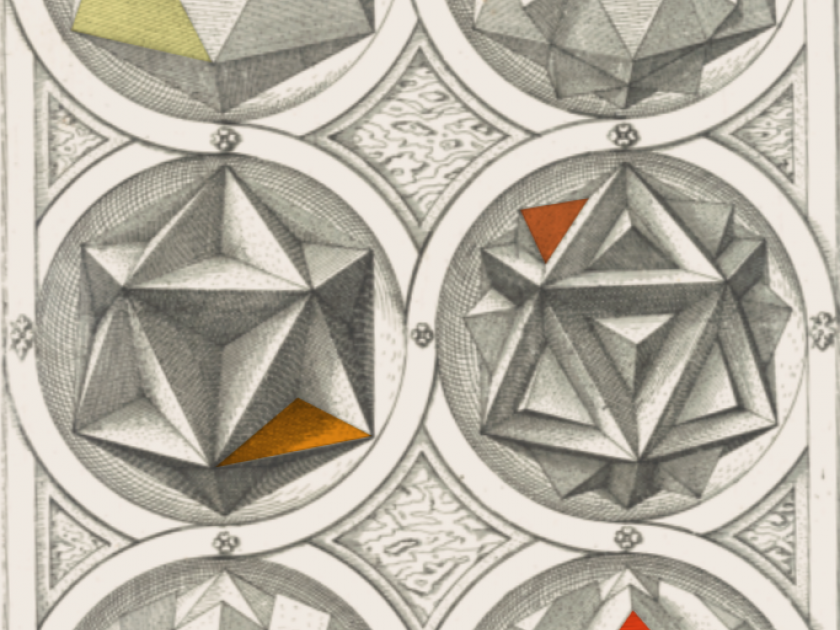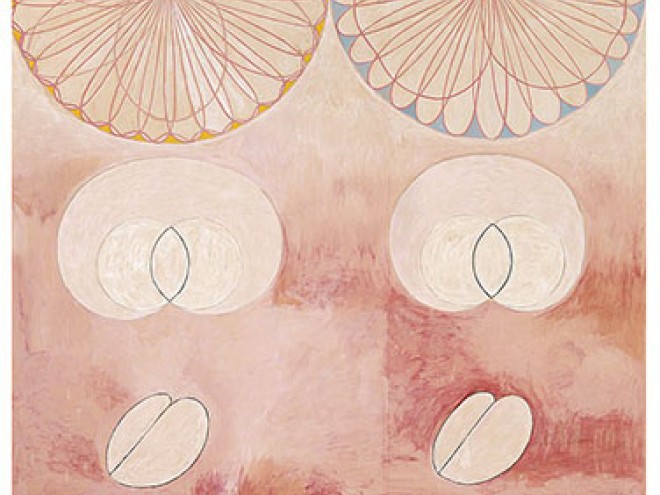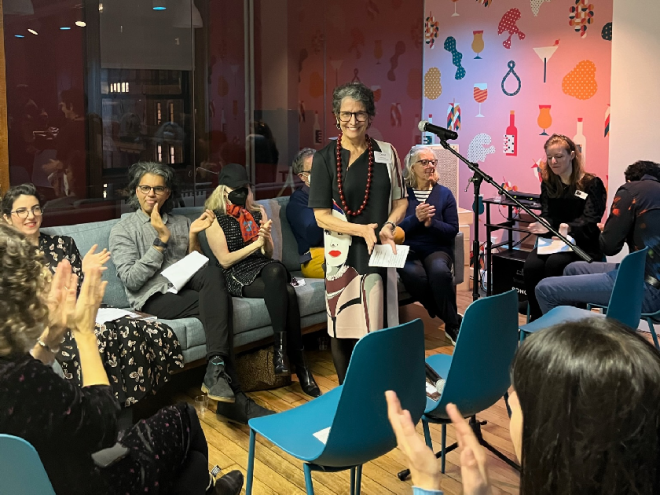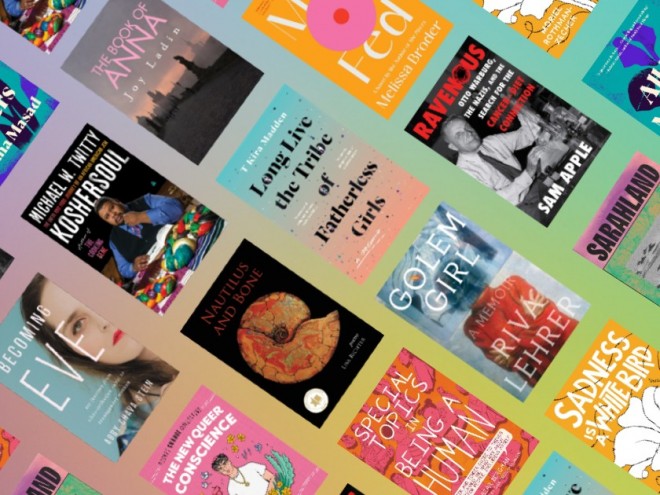
Image: page from Perspectiva Corporum Regularium, engraved by Jost Amman (1568) after Wenzel Jamnitzer (detail)
The Metropolitan Museum of Art, Harris Brisbane Dick Fund, 1924
Color overlay: Katherine Messenger
We’re told not to put style over substance, but in some books, style becomes substance. Such is the case in Joshua Cohen and Colum McCann’s latest novels, winners of the National Jewish Book Award for Fiction in 2021 and 2020, respectively.
Both books expand outward from real events. McCann’s Apeirogon follows two men, Israeli Rami Elhanan and Palestinian Bassam Aramin, who bond after each loses a young daughter in the unrelenting conflict with which they live. In The Netanyahus, Cohen transforms an anecdote told to him by the literary critic Harold Bloom into the story of Ruben Blum — a professor whose efforts to be accepted in a remote college town in New York state are jeopardized when he hosts a brash Israeli colleague, Ben-Zion Netanyahu.
In recasting true happenings as fiction, Cohen and McCann play with genre and form, unraveling our expectations about narrative structure as well as commonly held ideas about history. In conversation, the two authors delve into the craft of conveying the multitude of viewpoints that can surround a situation, and the near-impossibility of reconciling them.
Becca Kantor: In your recent novels, both of you fictionalize historical events in distinctive ways. How did you decide what form these renderings would take?
Joshua Cohen: I increasingly doubt the idea of an author making decisions while writing fiction. Maybe a better way of putting it is: the fiction decides. All I can do is remain receptive and write, and then examine the choices made for me and try to justify them or try again de novo. I think that’s my primary agency: making the call of whether or not I should toss something out and start again, with the hope that this time I’m inhabited by some better spirit.
Colum McCann: I agree. I even doubt the word “fiction.” The relationship between fiction and supposed truth has always been complicated. Where do we draw the line? The anthropologist Clifford Geertz wrote about the real being imagined, and the imagined being real. I have often said that facts are mercenary.They can be manipulated to do whatever work you need them to do. But this isn’t necessarily negative — they can work miracles.
Rather than attempting to record “facts,” I try to capture “texture”: small, anonymous moments in conjunction with overarching epic ones. I think texture gets to the deeper truth. But don’t get me wrong. I don’t privilege the poet over the journalist, or the fiction writer over the essayist. I just like the proper word put in the proper place. On a very simple level it’s all about storytelling: can you tell a good story that reveals what Faulkner called “the human heart in conflict with itself ”?
As for the form the fiction or nonfiction takes, well, it comes down to a gut feeling. I write from a place that I don’t really understand, nor do I want to understand it in the sense that I do not want to be acutely conscious of what I’m trying to say. The reader might have a better understanding than I do.
BK: In a sense, both of these novels are about competing narratives of the past. Joshua, in The Netanyahus, Ruben tells us that the default American version of history is linear, while Netanyahu posits that the Jewish way of looking at history is circular — endless cycles of antisemitism. Are either of these concepts reflected in the shape of your own book?
JC: I think so, yes, but then I think writing anything is always some sort of argument between the tragic circle and the meliorist line, and the tensions between the two are bound to be reflected formally. I guess that in novels, the idea is to have a character change. But change is pretty inimical to Jewish storytelling, and to certain stories told about Jewish history. For Jews, change is a type of messianism, and so it’s either false or definitive, and that poses certain difficulties for Jewish narratives (I’m trying to avoid saying Jewish “plots”) no matter where they’re found — whether in my books or in the founding of Israel.
BK: Speaking of narrative form, “apeirogon” means “a shape with a countably infinite number of sides, approaching but not reaching a circle.” Colum, this definition seems to encapsulate not only the Israeli-Palestinian conflict, but also the form of your novel — in which brief, numbered chapters build to the two testimonies at the book’s center and then decrease, coming full circle. How did you decide to structure your novel this way?
CM: The idea of an apeirogon sounds crazy and impossible and beautiful all at once — and it is.You can be part of an infinite shape and land on any finite point within it. You can be at home and simultaneously everywhere else. And you can be lost, too. I think it’s a word that suggests so much about who and where we are now. It’s also a word that fits in well with the Israeli-Palestinian conflict, not because it suggests that the conflict is impossible to understand, or that it has no ending point — far from it. It’s more because we are all complicit, we are all involved, no matter who or where we happen to be.
Telling the story “apeirogonally” seemed like the right way to go. It’s structured in 1,001 cantos, and it can be confusing, especially at first. But the situation in Israel and Palestine is also confusing. I wanted to replicate this confusion by trying to disorient the reader in the beginning — not gratuitously, but in order to show that confusion is okay and can even be embraced. Confusion can put us on the verge of understanding.
The idea of an apeirogon sounds crazy and impossible and beautiful all at once — and it is. You can be part of an infinite shape and land on any finite point within it. You can be at home and simultaneously everywhere else.
BK: One way both of you highlight alternate interpretations of history is by breaking up the main narration with other material. Joshua, Ruben’s narration is interrupted by two contradictory letters about Netanyahu. In the “Credits and Extra Credit” section at the end of the book, an email from the woman who inspired the character of Judith calls the rest of the story into question. How do these various forms of correspondence add to our understanding of competing stories in the novel?
JC: I like complication (and not just for the sake of complexity). I like bringing in multiple voices and points of view, doing my best to deny official accounts and use characters to contradict and correct one another. This is also how history works or at least how it’s written, with each generation challenging the previous one, undercutting and upending its complacencies. If I can bring something of this process into print — into a visceral experience for the reader — I think I’ve succeeded.
I’ve wound up including fictional fragmentary texts in all of my books so far: in Four New Messages and Book of Numbers, there are emails, chats, and interviews; and in The Netanyahus, there are letters of recommendation and lectures. I usually say that my interest in this comes from technology, my sense of living today enmeshed in other people’s texts, and even in self-generated, authorless texts like some algorithms and source code, but now that I’m answering questions for a Jewish publication, I’ll add that it might also have something to do with the interpretative tradition, trying to bring pilpul to the novel.
BK: The narration of Apeirogon is also frequently interrupted by other material, including report cards, transcriptions of graffiti, and photographs. The photographs are uncaptioned, so readers can never be completely sure what they’re looking at. Colum, how did you choose these images? Do you see them as confirming the veracity of the text, or drawing attention to its subjectivity?
CM: I like the Whitmanesque nature of what Joshua said: “Do I contradict myself? Very well then I contradict myself.” We all contain those multitudes. The photos help and they also confuse.
I wanted to write a novel that would make sense to those people who know Israel and Palestine intimately, but I also wanted it to make sense to those who know nothing about the region. I compare reading the book to going into a building … Some people will only enter the ground floor; others will reach every single floor. But no matter how much of the house the reader sees, the experience has to reveal something deep and abiding.
I began by making spider diagrams and hopping about on the Internet. Sometimes I went down a digital rabbit-hole and ended up miles away. But the fact was that I had taken a journey, and the journey mattered. I wondered if I could replicate that feeling while using the story of Rami and Bassam as a touchstone. As a novelist, you’re continually struck by images. They become their own form of poetry. They suggest rather than instruct.
BK: Joshua, language has so much political weight in The Netanyahus. People and schools are renamed in response to anything from a desire to assimilate to shifts in social mores, and Netanyahu insists that most historians’ unfamiliarity with Hebrew is really just antisemitism. How do you see language as a reflection of belonging?
JC: Language is belonging, pure and simple. It is the mark, the sign of who you are, who you’ve been, and who you want to be. Every word in every language is like a shibboleth: it tells whoever the gatekeeper is whether or not you can pass. Or perhaps an even more biblical way of putting it is this: language is creationary. God spoke and the world was created. We speak and create ourselves.
Every word in every language is like a shibboleth: it tells whoever the gatekeeper is whether or not you can pass.
BK: Colum, you pay a good deal of attention to the absence of language — nonverbal sounds and silence. Could you describe the challenges of conveying these in the text, and why it was important to do so?
CM: I didn’t realize this until you asked the question, but you’re correct. There’s so much silence in the novel. John Cage’s 4’33” piece. The silence between words. There are even two passages that are left blank. I suppose I wanted to capture the importance of listening, which is when our best silence happens.
BK: Rather than being propelled by action, the chapters of Apeirogon are often connected by motifs, which can be beautiful and horrific in turn. For example, in one chapter you describe a musical composition with an opening “as seductive as the shape and fragrance of a flower” and in the next, you reveal that Abir’s name means “fragrance of the flower.” Later in the book, we learn that in Israeli army slang, “a flower is someone who has been seriously wounded in battle.” How did you go about drawing out this type of association?
CM: I found that I was trying to write Apeirogon as if it were a piece of music. Symphonic. There I was like a conductor, getting this going with the cello and that going with the flute, and then all of a sudden, a figure would arrive at the back of the hall with a brand-new instrument in her hand, an instrument that I had never seen before. And I had to invite this new musician into the orchestra and try to incorporate her music into the ongoing sound.
That’s what it felt like when I was writing this book. It was thrilling and exhausting at the same time. I was constantly trying to modulate the music. I know nothing about music, really — I do sing, but I can’t; I’m that classic bore at parties. Yet I know that music must remain the alpha and omega of a novel. Tonal and atonal at the same time. I’d sacrifice meaning for music any day, although ideally you would have both. I wanted the novel to work contrapuntally, holding numerous melodic lines at the same time. It’s the same when we think about others — we have to think contrapuntally. That’s in essence the magic of Rami and Bassam. They are gentlemen of the contrapuntal.
BK: Joshua, you often use juxtapositions to comedic effect in The Netanyahus. For example, Rube’s mother-in-law’s soliloquy on the history of beds is offset by “a gaseous hiss” from her husband in the bathroom. What draws you toward comedy as a writer? What makes it such an effective way of revealing these characters’ clashes?
JC: The comedy of my novel — and in my opinion, of all novels — is meant to smooth the way between laughing at others and laughing at oneself. The former is notoriously easier than the latter, but the novel attempts to bridge that gap through recognition: hopefully the reader will find a character funny in one sentence, and then much like themselves in the next. It’s the clash between those two reactions that interests me.
BK: Colum, in Apeirogon, you note that Goethe described how different art forms correspond to each other: “Music is liquid architecture … and architecture is frozen music.” There are many other references to art throughout the novel, too. Can you highlight one work in particular that inspired you?
CM: The 1,001 cantos that comprise the novel allude to the tales of One Thousand and One Nights. By telling their stories, Rami and Bassam stay alive and keep their daughters’ memories alive, too. So they tell their stories over and over and over again.
This structure didn’t come to me immediately. I knew I wanted a fragmented narrative but I didn’t decide to put it into 1,001 cantos until about two years into the writing process.
Once I decided on the form, Borges became a guiding light for me. I want to go beyond the bounds of the obedient ordinary: this is what Bassam and Rami do in their own way. They imagine somewhere new. This is a form of freedom. What literature can do is honor the heartbreak of the world and at the same time lift us out of our abulia, if only temporarily.
BK: In The Netanyahus, Rube’s daughter struggles with writing a college application essay on the topic “What is fairness?” How do you both approach this question as authors? Is it possible to be fair in a fictionalization of real events? What are the ethics involved in telling someone else’s story?
JC: Fairness is a fiction that each society and person creates. That said, I try not to antagonize (or protagonize) my friends, unless the spirits demand it. I think the question you’re asking is, is literature more important than life? And my answer to that is maybe, sometimes, I don’t know, whose literature, whose life, and anyway aren’t they the same? But ask me the same question tomorrow — or better, tell me a secret you don’t want betrayed — and the answer you’ll get might be quite different.
CM: Ha! Yes and yes. You know, there’s an old statement about football or soccer: “Football is not a matter of life and death … it’s so much more important than that.” Fairness comes down to honesty. And honesty is many-sided.
As for telling someone else’s story, there is nothing to do but that. If I were writing directly about myself, I would lie through my teeth. Which is why interviews are fascinating and terrifying. I’m pretty sure I commit at least one howling lie in every interview.
Becca Kantor is the editorial director of Jewish Book Council and its annual print literary journal, Paper Brigade. She received a BA in English from the University of Pennsylvania and an MA in creative writing from the University of East Anglia. Becca was awarded a Fulbright fellowship to spend a year in Estonia writing and studying the country’s Jewish history. She lives in Brooklyn.



